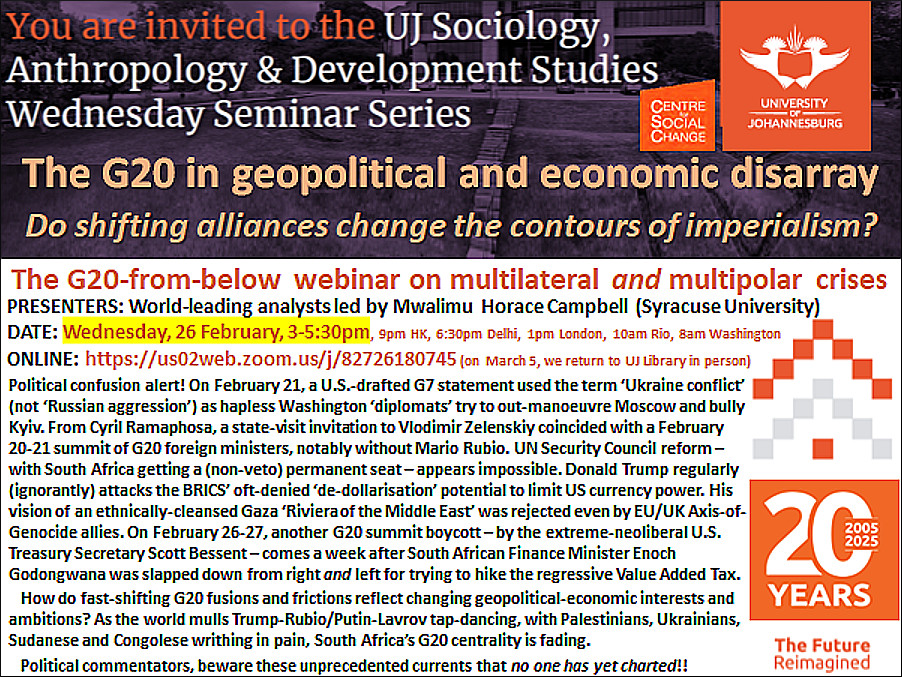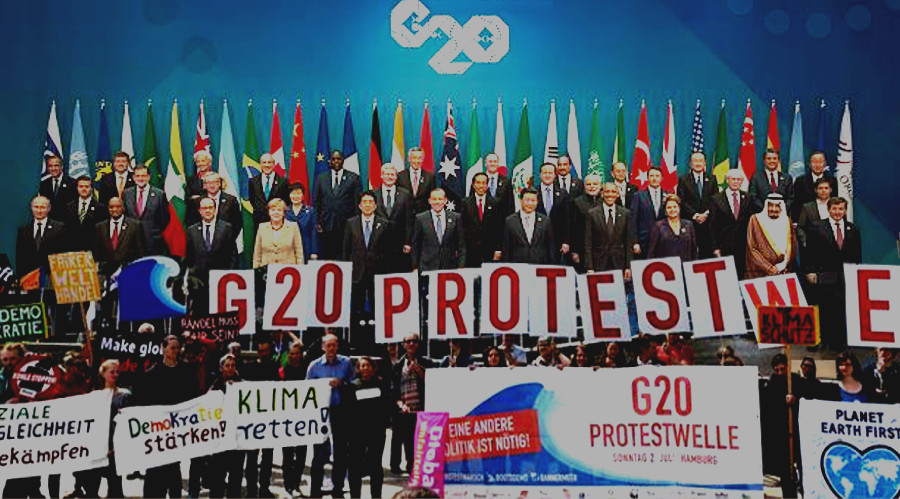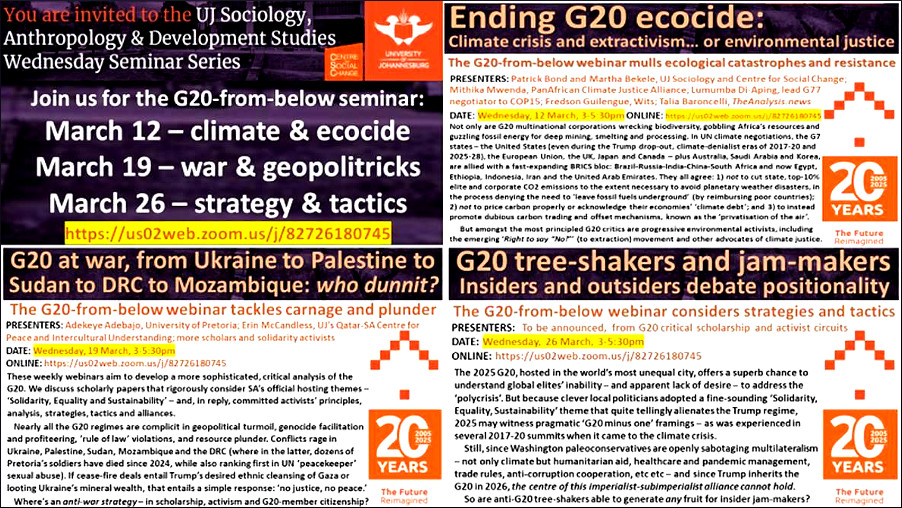 |
|
THE G20 FROM BELOW WEBINAR SERIES  The format will allow for discussion of seminar papers that rigorously consider whether the South African official hosting themes – ‘Solidarity, Equality and Sustainability’ – can be realised within G20 parameters, for the first 90 minutes; and then another 60 minutes for state-economy-environment-society relations considered from the bottom-up, featuring experiences of local-to-global progressive activists.
The context includes:
The format will allow for discussion of seminar papers that rigorously consider whether the South African official hosting themes – ‘Solidarity, Equality and Sustainability’ – can be realised within G20 parameters, for the first 90 minutes; and then another 60 minutes for state-economy-environment-society relations considered from the bottom-up, featuring experiences of local-to-global progressive activists.
The context includes:• 1) failures of G20 and multilateral top-down governance in climate management (UNFCCC), trade (WTO), finance (IMF and World Bank), and geopolitical stability (UN Security Council and General Assembly); • 2) a fast-shifting balance of political forces featuring the rise of ‘populist nationalist’ ideology within leading G20 governments (the United States, Italy, Argentina), as opposed to advocacy for vaguely-defined ‘multipolar’ politics (the rapidly-expanding BRICS as well as potentially-affiliated autocracies such as Saudi Arabia and Turkiye), amidst durable neoliberal regimes (UK, France, Germany, Canada, Australia, Japan, South Korea), and the beleaguered social democratic tradition (Mexico); • 3) extreme inequality especially in South Africa (world’s worst) and Brazil, and across the world as the top 20 most profitable firms are dominated by U.S. and Chinese ‘techno-feudal’ Big Data and banks, and by Saudi, Western and BRICS fossil fuel interests, in turn generating unprecedented power for associated tycoons (e.g. Johannesburg native Elon Musk) over states, social surveillance, reactionary political and speculative financial machinations, and greenhouse gas emissions; • 4) a stalling of corporate globalisation – a process that began with the 2008 world financial crisis, just as the G20 took its current form – such that protectionist, xenophobic tendencies associated with ‘paleo-conservative’ forces render neoliberal trade, finance, direct-investment and labour-migration processes less effective, and as both ‘culture wars’ – featuring revanchist misogyny, racism, homophobia and transphobia – and super-exploitative economic processes (‘accumulation by dispossession’) are more decisively waged against already oppressed peoples and classes; • 5) conflict associated with G20 aggressors (in non-G20 sites) – from Ukraine to Palestine to Sudan to Myanmar, and perhaps now also from Panama to Greenland – as both neo-conservative Western regimes and expansionist BRICS armies spend record amounts of fiscal resources on militarisation; and • 6) doubts about leadership sincerity raised by worsening injustices at home, in the host country (recently subjected to the Stilfontein Massacre of mainly immigrant mineworkers) and nearly all other G20 countries. The ‘world system’ has been identified by Samir Amin and Immanuel Wallerstein (regular Johannesburg visitors prior to their 2018 and 2019 deaths) as containing a ‘core’ and a ‘semi-periphery’ – which are mainly conjoined in the G20 – and a periphery. Within the core and semi-periphery, as well, can be found a ‘Global South.’ It is from this bottom-up standpoint that our webinars will proceed, as a means of asking difficult questions about whether the G20 network can serve society public interest and preserve the natural environment for future generations. And if it cannot, what should progressive movements do, in reaction? Weekly Zoom location: https://us02web.zoom.us/j/82726180745 Weekly in-person location: UJ Anthropology and Development Studies Seminar Room (D Ring 506), Auckland Park Campus The first hybrid seminar in the series will be on 12 February, 3pm SA time: “The G20 and BRICS in Global Sociocultural Evolution” – presented by: • Christopher Chase-Dunn, Distinguished Professor of Sociology and Director of the Institute for Research on World-Systems, the University of California-Riverside. • Şakin Erin, Assistant Professor of Sociology, University of Science and Arts of Oklahoma Back |
 Links Search |
||||||
|
|||||||


